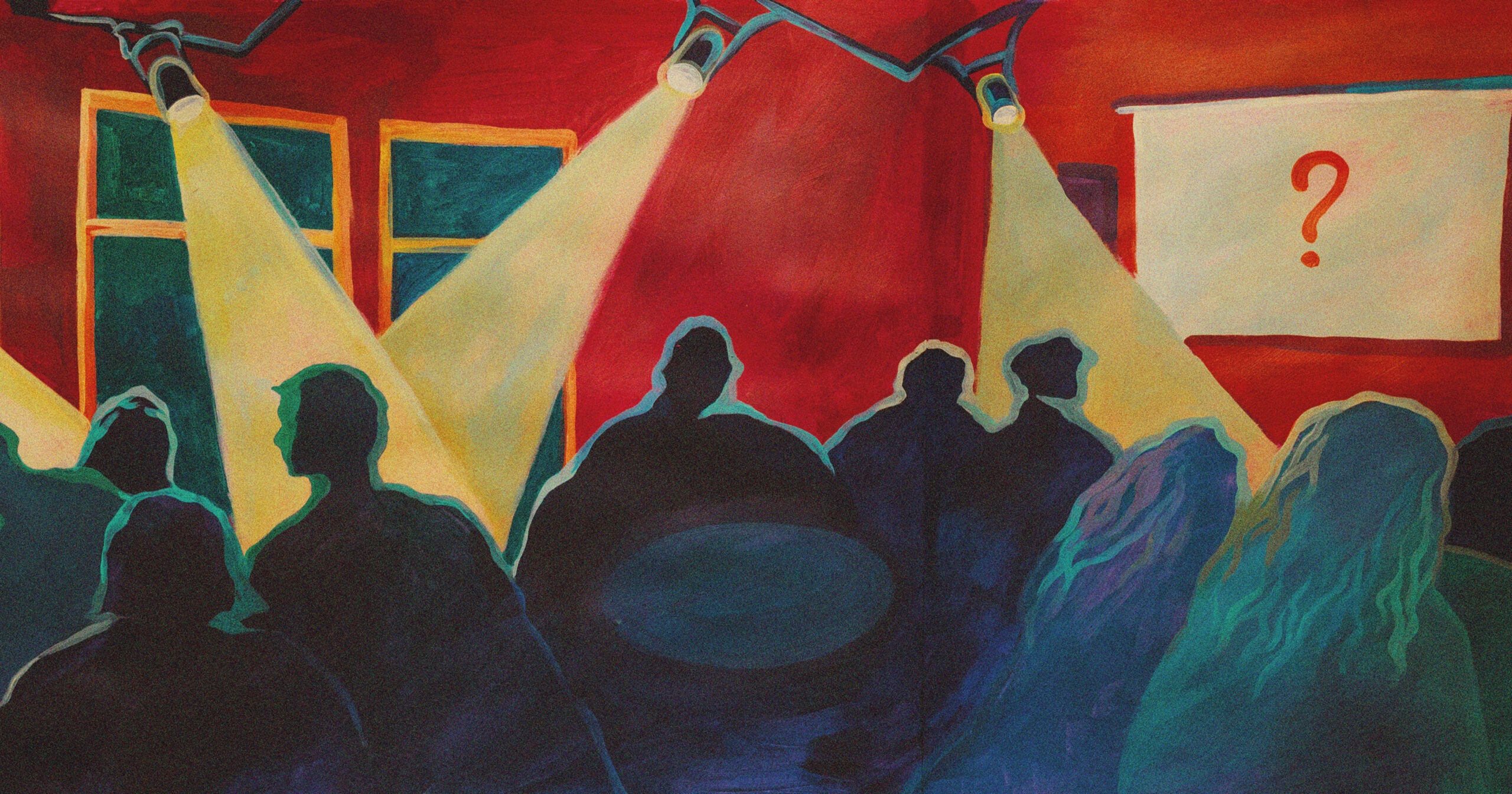The lights dim. The music hushes. The room hums with expectation. Drinks are sipped, pens are clicked and pieces of paper are shuffled in anticipation. It’s time to start the quiz.
In the UK, the pub quiz is at once both light-hearted and deadly serious. It’s an activity that dates back at least 50 years – possibly longer – and has become a global phenomenon. These days, though, it doesn’t have to involve alcohol or a pub. Quizzes take place in community centres, churches, schools and sports halls all around the world, from India to Finland.
Whatever objective a quiz has – whether it’s to raise money for charity, boost midweek takings or simply be fun – there’s another important side effect. In a time when you can easily find trivia-related questions on your phone, an organised event offers something more. While ostensibly making them compete, a good quiz brings people together.
Teaming up
Community quizzes – to give them a name that encompasses every type of location – always involve teams, usually numbering between two and six people. One of the benefits is that you don’t need to know the people on your team before you begin playing together. At many events, strangers team up on the night. It might feel a little strange when someone you’ve never met before passionately insists they know the right answer, but that’s the beauty of a quiz. You never know what might happen next.
Quizzes like these also work against the tribe mentality. The ideal team includes a range of different people who contribute a broad range of knowledge. Those who are up to date on current affairs need others who know their history. Sport lovers and culture buffs have areas of specialist expertise, while polymaths are generalists who know a little bit about lots of things. There’s a place for everyone.
While these kind of quizzes are great ways to meet socially while not having to make small talk, even the rivalry between opposing teams offers some friendship potential. The practice of swapping answer papers with another team when it’s time for marking them can be a way to enter conversation, perhaps showing your admiration for their knowledge, or commiserating with each other if you both lose.
The host with the most
However, a quiz is only as good as its key element: the host. The enthusiasm and attitude of the person asking the questions can influence whether your team ends up hunched over the answer paper, muttering darkly about cheating, or stays sharing a table – and a laugh – until the end of the night.
The host has a difficult job. Not only must they initially find some interesting questions to ask, then work out the correct answers to these, they may potentially have to tackle hecklers on the night and ensure the event finishes on time. But it’s a challenge with a huge reward – the creation of a mini community made up of rivals and one-time strangers.
Pete Fijalkowski is a musician and events organiser from Worthing in south-east England. He’s been hosting a music quiz called I Predict a Pop Quiz for the past 18 years, having started in the neighbouring city of Brighton and Hove before landing in Worthing itself. ‘The landlord of a local pub knew me as a musician and really wanted to have a pop quiz in his pub on one of the weekdays, which was very quiet,’ says Pete, explaining how he got started as a quiz host. Despite having played big gigs, including the Glastonbury music festival, Pete says he felt nervous because he ‘wasn’t used to public speaking.’ However, the quizzes took off and became, for many of the pubs he’s worked at, their busiest weekday nights.
From the start, Pete knew that he wanted it to be different ‘from the serious nature of some quizzes that I’ve been to.’ He asks some traditional questions related to music, but there’s also ‘an element of silliness and surrealness.’ During a favourite round, called Smell My Elbow, Pete squirts a pop star’s branded perfume on his elbow and, accompanied by a self-produced jingle, asks participants to guess whose perfume it is from a choice of three famous names. Dryly, he adds: ‘Some people are slightly perplexed by this.’
Rounds like this have an added bonus, in that those players who don’t know much about pop music ‘can be entertained as well.’ Pete recognises a big element of his quiz is that ‘people talk to each other… [it’s] a night where it can open conversations between team mates.’
In fact, one of Pete’s aims is to make sure all participants feel included. This guides the type of questions he chooses, the prizes on offer and the way the quiz is run. With so much quizzing experience under his belt, who better than Pete to offer some top tips on hosting a quiz that brings everyone together with fun and warmth.
Ask questions that let the whole team contribute
‘I probably spend about six or seven hours compiling questions,’ says Pete of the preparation for his monthly quiz. He aims to include elements unrelated to pop music, such as creating images that blend birds with pop stars. This means, he says, that ‘someone who’s an ornithologist but knows nothing about pop music might be able to contribute an answer when the rest of the team is stumped.’
Another technique is to ask questions that can be worked out, rather than being definitively known or not known. ‘I like questions where maybe there are multiple answers. So instead of naming one hit by an artist, can you name four hits by the artist,’ says Pete. ‘Everybody in the team’s got a chance to come in with one or two of the answers, so more people can contribute and feel more involved. That’s really important.’
As an example, rather than a question such as: ‘Who became the UK’s prime minister in 1979?’ he says, you could instead ask: ‘Name all the UK prime ministers since World War Two.’ This gives everyone the chance to chip in.
Adapt for your audience
Pete says it’s always important to create the type of quiz for the audience you have and to be prepared to adapt as you go. As well as regular music quizzes in pubs, Pete also runs general-knowledge quizzes in care homes. ‘They’re a great way of… stirring up memories and starting conversations with older people, including those with Alzheimer’s or dementia,’ he says. ‘It’s all about finding questions that are stimulating and at the right level for your audience.’
While it can be tempting to ask questions on subjects you’re interested in personally, that might mean only people like you will be able to answer them. ‘Think about a round that you know one kind of person will do really well,’ says Pete, and then ‘think of a round that person won’t necessarily do as well in, that somebody else has the chance of shining at.’ It makes the quiz ‘expansive’, says Pete, and includes everyone.
Have silly prizes
‘I decided very early on that I didn’t like how competitive some quizzes got,’ observes Pete. ‘I didn’t want people coming because they wanted to get the jackpot.’ This point was proven by a quiz he ran that went disastrously wrong when the pub offered a big prize to the winners, and fisticuffs broke out in the bar between the two leading teams.
Instead, Pete trawls charity and discount shops for quirky presents, or things such as a multipack of crisps that can be split among the winning team. The victors get first choice of the prizes, but in Pete’s quiz, even the losers end up with a reward.
Make the participants the stars
‘Sometimes I have questions that are open ended and I don’t actually give points for them,’ says Pete. These might be: ‘What was your favourite ever gig?’ or ‘Tell us about a time you met a pop star in a supermarket.’
This means team members talk together about the answers and when they’re submitted, Pete reads out the best ones. ‘What’s nice is when the quiz is really buzzing,’ he says. ‘You read out some very funny answers, which makes everybody laugh and brings everyone together. People enjoy the fact that their answer was read out and gets a response.’ The beauty, he says, is that some of the nights end up ‘really funny, with the whole room laughing and enjoying it.’
Be prepared to work at it
A quiz is a lot less work if you get the questions off the internet and ask teams to mark each other’s question papers. But if you want to create an event that’s inclusive, where everyone can have a go, laugh together and make friends across the barricades (aka the quiz table), you need to put in the hours.
Pete marks the papers himself – due to the unusual nature of some of the questions – and records musical segments in his spare time to play during the event. As with so many things, what you get out depends on what you put in.
However, unless it’s a quiz for charity, you can make money running a quiz by charging an entry fee for each team or participant. Pete says ‘about half’ the entrance fees go on prizes, and the rest he counts as earnings.
So whether you’re organising a quiz for a family Christmas get-together or running a trivia night in a church hall for several hundred people, remember this: you’re in charge. You can bring the room together with silliness, laughter and gentle competition. Because, at the end of the day, it’s important to remember that a quiz is just a bit of fun.
Find out more about Pete’s quizzes at facebook.com/IPredictAPopQuiz for more on Pete’s music, go to petefij.com


